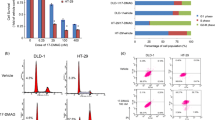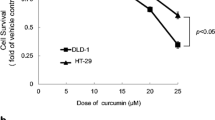Abstract
Glucose-regulated protein 78 (GRP78) is a key modulator of prostate cancer progression and therapeutic resistance. Prostate cancer is a worldwide health problem, and therapeutic resistance is a critical obstacle for the treatment of hormone-refractory prostate cancer patients. Shikonin inhibits prostate cancer proliferation and metastasis. However, the role of GRP78 in the cytotoxic effect of shikonin in prostate cancer cells remains unclear. GRP78 expression was abolished using small interfering RNA (siRNA), and the anticancer effects of shikonin were assessed using MTT assays, the XCELLigence biosensor, flow cytometric cell cycle analysis, and Annexin V-PI apoptotic assays. PC-3 cells expressed more GRP78 than DU-145 cells, and the MTT assays revealed that DU-145 cells were more sensitive to shikonin than PC-3 cells. GRP78 knockdown (GRP78KD) PC-3 cells were more sensitive to shikonin treatment than scrambled siRNA control cells. Based on cell cycle analysis and AnnexinV-PI apoptotic assays, apoptosis dramatically increased in GRP78KD cells compared with the control PC-3 in response to shikonin. Finally, in response to shikonin treatment, Mcl-1 and Bcl-2 levels increased in the scrambled control cells treated with shikonin, whereas Bcl-2 decreased and Mcl-1 slightly increased in the GRP78KD PC-3 cells. The levels of Bax and Bad did not change in the scrambled control or GRP78KD cells after shikonin treatment. These results are consistent with the increased sensitivity to shikonin after knockdown of GRP78. GRP78 expression may determine the therapeutic efficacy of shikonin against prostate cancer cells.





Similar content being viewed by others
References
Siegel R, Naishadham D, Jemal A. Cancer statistics, 2013. CA: Cancer J Clin. 2013;63:11–30.
Chen CD, Welsbie DS, Tran C, Baek SH, Chen R, Vessella R, et al. Molecular determinants of resistance to antiandrogen therapy. Nat Med. 2004;10:33–9.
Harris WP, Mostaghel EA, Nelson PS, Montgomery B. Androgen deprivation therapy: Progress in understanding mechanisms of resistance and optimizing androgen depletion. Nat Clin Pract Urol. 2009;6:76–85.
Karantanos T, Corn PG, Thompson TC. Prostate cancer progression after androgen deprivation therapy: Mechanisms of castrate resistance and novel therapeutic approaches. Oncogene. 2013;32:5501–11.
Heinlein CA, Chang C. Androgen receptor in prostate cancer. Endocr Rev. 2004;25:276–308.
Isaacs JT, Isaacs WB. Androgen receptor outwits prostate cancer drugs. Nat Med. 2004;10:26–7.
Sternberg CN, Petrylak DP, Madan RA, Parker C. Progress in the treatment of advanced prostate cancer. Am Soc Clin Oncol Educ Book / ASCO Am Soc Clin Oncol Meet. 2014:117–131.
Chen X, Yang L, Oppenheim JJ, Howard MZ. Cellular pharmacology studies of shikonin derivatives. Phytother Res: PTR. 2002;16:199–209.
Wei PL, Tu CC, Chen CH, Ho YS, Wu CT, Su HY, et al. Shikonin suppresses the migratory ability of hepatocellular carcinoma cells. J Agric Food Chem. 2013;61:8191–7.
Andujar I, Rios JL, Giner RM, Recio MC. Shikonin promotes intestinal wound healing in vitro via induction of tgf-beta release in iec-18 cells. Eur J Pharm Sci Off J Eur Fed Pharm Sci. 2013;49:637–41.
Wang Y, Zhou Y, Jia G, Han B, Liu J, Teng Y, et al. Shikonin suppresses tumor growth and synergizes with gemcitabine in a pancreatic cancer xenograft model: Involvement of nf-kappab signaling pathway. Biochem Pharmacol. 2014;88:322–33.
Chen Y, Zheng L, Liu J, Zhou Z, Cao X, Lv X, et al. Shikonin inhibits prostate cancer cells metastasis by reducing matrix metalloproteinase-2/-9 expression via akt/mtor and ros/erk1/2 pathways. Int Immunopharmacol. 2014;21:447–55.
Shi S, Cao H. Shikonin promotes autophagy in bxpc-3 human pancreatic cancer cells through the pi3k/akt signaling pathway. Oncol Lett. 2014;8:1087–9.
Guo J, Chen XF, Liu J, Lin HY, Han HW, Liu HC, Huang SC, Shahla BK, Kulek A, Qi JL, Wang XM, Ling LJ, Yang YH. Novel shikonin derivatives targeting tubulin as anticancer agents. Chem Biol Drug Des. 2014.
Lee MJ, Kao SH, Hunag JE, Sheu GT, Yeh CW, Hseu YC, et al. Shikonin time-dependently induced necrosis or apoptosis in gastric cancer cells via generation of reactive oxygen species. Chem Biol Interact. 2014;211:44–53.
Fan Y, Jin S, He J, Shao Z, Yan J, Feng T, et al. Effect of beta, beta-dimethylacrylshikonin on inhibition of human colorectal cancer cell growth in vitro and in vivo. Int J Mol Sci. 2012;13:9184–93.
Jang SY, Jang EH, Jeong SY, Kim JH. Shikonin inhibits the growth of human prostate cancer cells via modulation of the androgen receptor. Int J Oncol. 2014;44:1455–60.
Kim SS, Cho HJ, Kang JY, Kang HK, Yoo TK. Inhibition of androgen receptor expression with small interfering rna enhances cancer cell apoptosis by suppressing survival factors in androgen insensitive, late stage lncap cells. TheScientificWorldJOURNAL. 2013;2013:519397.
de Ridder G, Ray R, Misra UK, Pizzo SV. Modulation of the unfolded protein response by grp78 in prostate cancer. Methods Enzymol. 2011;489:245–57.
Wu CT, Wang WC, Chen MF, Su HY, Chen WY, Wu CH, et al. Glucose-regulated protein 78 mediates hormone-independent prostate cancer progression and metastasis through maspin and cox-2 expression. Tumour Biol J Int Soc Oncodevelopmental Biol Med. 2014;35:195–204.
Cheng AL, Kang YK, Chen Z, Tsao CJ, Qin S, Kim JS, et al. Efficacy and safety of sorafenib in patients in the asia-pacific region with advanced hepatocellular carcinoma: A phase iii randomised, double-blind, placebo-controlled trial. Lancet Oncol. 2009;10:25–34.
Chiou JF, Tai CJ, Huang MT, Wei PL, Wang YH, An J, et al. Glucose-regulated protein 78 is a novel contributor to acquisition of resistance to sorafenib in hepatocellular carcinoma. Ann Surg Oncol. 2010;17:603–12.
Chang YJ, Chiu CC, Wu CH, An J, Wu CC, Liu TZ, et al. Glucose-regulated protein 78 (grp78) silencing enhances cell migration but does not influence cell proliferation in hepatocellular carcinoma. Ann Surg Oncol. 2010;17:1703–9.
Wang SK, Liang PH, Astronomo RD, Hsu TL, Hsieh SL, Burton DR, et al. Targeting the carbohydrates on hiv-1: Interaction of oligomannose dendrons with human monoclonal antibody 2 g12 and dc-sign. Proc Natl Acad Sci U S A. 2008;105:3690–5.
Sowinski S, Jolly C, Berninghausen O, Purbhoo MA, Chauveau A, Kohler K, et al. Membrane nanotubes physically connect t cells over long distances presenting a novel route for hiv-1 transmission. Nat Cell Biol. 2008;10:211–9.
Dong D, Ni M, Li J, Xiong S, Ye W, Virrey JJ, et al. Critical role of the stress chaperone grp78/bip in tumor proliferation, survival, and tumor angiogenesis in transgene-induced mammary tumor development. Cancer Res. 2008;68:498–505.
Lien YC, Wang W, Kuo LJ, Liu JJ, Wei PL, Ho YS, Ting WC, Wu CH, Chang YJ. Nicotine promotes cell migration through alpha7 nicotinic acetylcholine receptor in gastric cancer cells. Ann Surg Oncol. 2011.
Tai CJ, Wang JW, Su HY, Wang CK, Wu CT, Lien YC, et al. Glucose-regulated protein 94 modulates the therapeutic efficacy to taxane in cervical cancer cells. Tumour Biol J Int Soc Oncodevelopmental Biol Med. 2014;35:403–10.
Wei PL, Kuo LJ, Wang W, Lin FY, Liu HH, How T, et al. Silencing of glucose-regulated protein 78 (grp78) enhances cell migration through the upregulation of vimentin in hepatocellular carcinoma cells. Ann Surg Oncol. 2012;19 Suppl 3:S572–9.
Ghosh N, Ghosh R, Bhat ZA, Mandal V, Bachar SC, Nima ND, et al. Advances in herbal medicine for treatment of ischemic brain injury. Nat Prod Commun. 2014;9:1045–55.
Chang IC, Huang YJ, Chiang TI, Yeh CW, Hsu LS. Shikonin induces apoptosis through reactive oxygen species/extracellular signal-regulated kinase pathway in osteosarcoma cells. Biol Pharm Bull;33:816–824.
Yang H, Zhou P, Huang H, Chen D, Ma N, Cui QC, et al. Shikonin exerts antitumor activity via proteasome inhibition and cell death induction in vitro and in vivo. Int J Cancer. 2009;124:2450–9.
Han W, Li L, Qiu S, Lu Q, Pan Q, Gu Y, et al. Shikonin circumvents cancer drug resistance by induction of a necroptotic death. Mol Cancer Ther. 2007;6:1641–9.
Chen HM, Wang PH, Chen SS, Wen CC, Chen YH, Yang WC, Yang NS. Shikonin induces immunogenic cell death in tumor cells and enhances dendritic cell-based cancer vaccine. Cancer Immunol Immunother;61:1989–2002.
Ahmed K, Furusawa Y, Tabuchi Y, Emam HF, Piao JL, Hassan MA, Yamamoto T, Kondo T, Kadowaki M. Chemical inducers of heat shock proteins derived from medicinal plants and cytoprotective genes response. Int J Hyperthermia;28:1–8.
36Luo B, Lee AS: The critical roles of endoplasmic reticulum chaperones and unfolded protein response in tumorigenesis and anticancer therapies. Oncogene;32:805–818.
Yoshihisa Y, Hassan MA, Furusawa Y, Tabuchi Y, Kondo T, Shimizu T. Alkannin, hsp70 inducer, protects against uvb-induced apoptosis in human keratinocytes. PLoS One;7:e47903.
Zhou H, Zhang Y, Fu Y, Chan L, Lee AS. Novel mechanism of anti-apoptotic function of 78-kda glucose-regulated protein (grp78): Endocrine resistance factor in breast cancer, through release of b-cell lymphoma 2 (bcl-2) from bcl-2-interacting killer (bik). J Biol Chem;286:25687–25696.
Martin-Perez R, Niwa M, Lopez-Rivas A. Er stress sensitizes cells to trail through down-regulation of flip and mcl-1 and perk-dependent up-regulation of trail-r2. Apoptosis;17:349–363.
Acknowledgments
This study was supported by grants from the Taipei Medical University and Taipei Medical University Hospital (101TMU-TMUH-01-2) and National Science council(NSC101-2314-B-038-016-MY3).
Conflicts of Interest
None
Author information
Authors and Affiliations
Corresponding authors
Additional information
Li-Jen Kuo and Chien-Yu Huang contributed equally to this work.
Rights and permissions
About this article
Cite this article
Kuo, LJ., Huang, CY., Cheng, WL. et al. Glucose-regulated protein 78 mediates the anticancer efficacy of shikonin in hormone-refractory prostate cancer cells. Tumor Biol. 36, 5063–5070 (2015). https://doi.org/10.1007/s13277-015-3157-0
Received:
Accepted:
Published:
Issue Date:
DOI: https://doi.org/10.1007/s13277-015-3157-0




